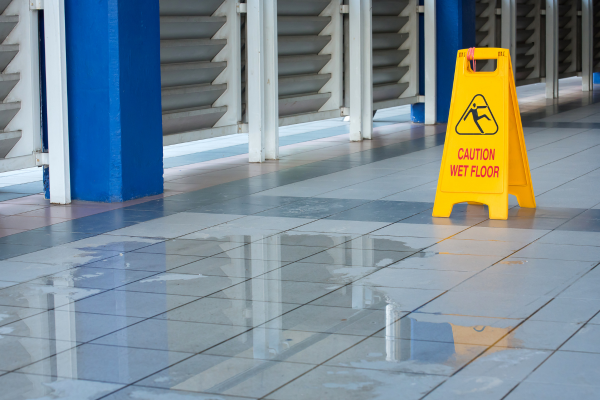
The presence of a wet floor sign can play a big part in determining who is liable for a slip and fall accident on someone’s property in Florida. But does the presence of a wet floor sign absolve the property owner of liability for a fall?
A wet floor sign does not automatically absolve the property owner of liability. But to fully understand the implications, we must look at the legal principles that apply to slip-and-fall cases in Florida.
Premises Liability
In Florida, there is a legal doctrine known as premises liability, which holds property owners responsible for maintaining safe conditions on their premises. When someone slips and falls on a wet floor, the property owner’s liability often depends on whether they knew or should have known about the dangerous condition and whether they took reasonable steps to address it.
Reasonable Care
The presence of a wet floor sign is one factor that courts consider when assessing whether the property owner took reasonable care to prevent a slip and fall. If a property owner places a wet floor sign in a conspicuous location, it can act as a warning to people about the potential hazard. But just putting up a sign is not always enough to absolve liability.
Florida courts typically examine the circumstances surrounding the accident to determine whether the property owner exercised reasonable care. Factors like how long the floor was wet, whether the property owner regularly inspects for dangers, and whether other measures could have been taken to prevent the accident are all considered by the court.
For example, if a customer spills a drink in a restaurant, and an employee promptly places a wet floor sign in the area while cleaning up the spill, the property owner may be considered to have taken reasonable steps to address the hazard. On the other hand, if a leaky roof consistently causes a puddle to form in a restaurant, and the property owner fails to make repairs to the roof or implement measures to prevent customers from walking through the puddle, the presence of a wet floor sign alone may not be enough to absolve liability.
Comparative Negligence
Florida follows something called a comparative negligence system, which means that if the injured person is found to have contributed to their own accident, their compensation may be proportionally reduced. For instance, if a court determines that the injured person was distracted and not paying attention to the wet floor sign, it might assign a percentage of fault to the injured person and reduce their compensation accordingly.
In some cases, the effectiveness of a wet floor sign in absolving liability may also depend on its visibility and clarity. Property owners have a duty to ensure that warning signs are easily noticeable and convey the appropriate message. If a wet floor sign is obscured or difficult to see, a court may find it did not effectively warn people of the hazard.
Contact a Florida Personal Injury Lawyer
Ultimately, the presence of a wet floor sign is just one factor among many that courts consider when determining liability for a slip and fall accident in Florida. Property owners have a duty to maintain safe conditions on their premises, and whether they fulfill that duty depends on the specific circumstances of each case. While a wet floor sign can help demonstrate that the property owner took steps to address a hazard, it does not guarantee immunity from liability.
If you have experienced a slip-and-fall injury, seeking legal advice is essential. You may be entitled to bring a personal injury claim against the responsible party.
Our legal team has more than 40 years of experience seeking justice for accident victims. Our attorneys have sought and won millions of dollars for our injured clients. Don’t allow your health or legal rights to go unaddressed after an accident.
Call 850-601-1111 to schedule a complimentary consultation with no obligations. This consultation will help you explore your legal options. Let us help you fight for fair compensation.


